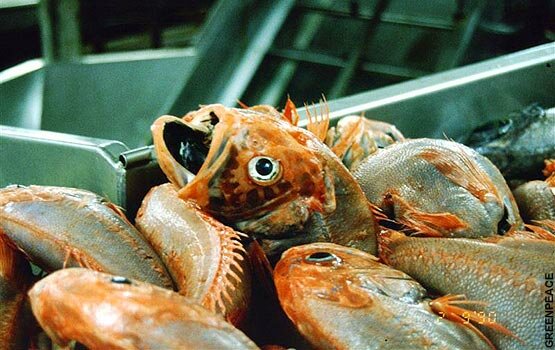Dramatic title perhaps, but maybe not quite so far-fetched.
In Sundance, one of the questions that came up repeatedly at showings of the End Of The Line movie is ‘what about climate change?’ assuming, rightly, that a warming planet will have implications for our fish populations too.

Orange roughy after being caught by a deep sea trawler
Well my practised response to this before I got there was simply that the effects of climate change make all of the issues of rapacious overfishing all the more important. They make the need for precaution when it comes to fishing, and the need for fully protected areas essential.
The truth is that climate change is already affecting our oceans, and we don’t know what the outcome will be on currents/temperature/salinity, which means we can’t predict what impact it will have on plankton or anything more complicated.
But common sense tells us, in degraded oceans, where we have already diminished sealife’s ability to cope, it won’t be good news.Then, just as we got here to promote a movie on overfishing, we find out that there’s a new article published in Science that shows a direct link between fishing and the effects of climate change.
Yes folks, fish poo can help save the ocean, by locking up carbon. So, the moral of the story is, that if we take all the fish out of the ocean, we increase acidification from climate change (and make it worse for everything else in the ocean in the process).
In the US, departing President Bush has left a ‘blue legacy’ behind him, showing that where there’s a political will, there’s a way. But whilst the US is ahead of many in creating protected areas, and arguably better at enforcing its fisheries, there is still a long way to go.
The US imports most of its fish, and a visit to the local supermarkets in Park City revealed some quite alarming species on display on the fish counter.
The two stand-outs are Chilean Sea Bass (also known as Patagonian toothfish) – which is fished using indiscriminate long-lines (that kill albatrosses) and has a huge amount of illegal fishing too: Orange Roughy, a deep-sea fish that lives to be up to 150 years old (how do you fish that sustainably, exactly?) and is often caught by bottom trawling seamounts.
That these species are still readily available shows how far we have to go, but it also shows something else – that everyday consumers can have a huge impact by simply not buying them.
And remember, every Orange Roughy and Chilean Sea Bass that doesn’t get fished helps save the oceans by simply doing its own business…
- Willie MacKenzie is part of the Oceans Campaign for Greenpeace UK
![]()



0 Responses to “Save the fish and save the world!”
Leave a Reply